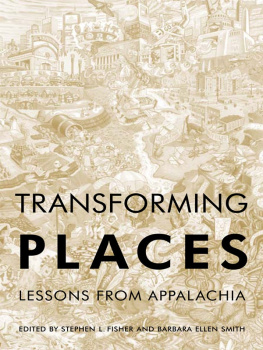TRANSFORMING PLACES
Transforming Places
Lessons from Appalachia

EDITED BY
STEPHEN L. FISHER
AND BARBARA ELLEN SMITH
UNIVERSITY OF ILLINOIS PRESS
URBANA, CHICAGO, AND SPRINGFIELD
2012 by the Board of Trustees
of the University of Illinois
All rights reserved
Manufactured in the United States of America
C 5 4 3 2 1
 This book is printed on acid-free paper.
This book is printed on acid-free paper.
Library of Congress Cataloging-in-Publication Data
Transforming places : lessons from Appalachia /
edited by Stephen L. Fisher and Barbara Ellen Smith.
p. cm.
Includes bibliographical references and index.
ISBN 978-0-252-03666-8 (hbk. : alk. paper)
ISBN 978-0-252-07838-5 (pbk. : alk. paper)
ISBN 978-0-252-09376-0 (e-book)
1. Community organizationAppalachian Region.
2. Social actionAppalachian Region.
3. Political participationAppalachian Region.
4. Appalachian RegionSocial conditions.
I. Fisher, Stephen L., 1944 II. Smith, Barbara Ellen, 1951
HN79.A127T73 2012
330.974dc23 2011027791
CONTENTS
Marta Maria Miranda
Stephen L. Fisher and Barbara Ellen Smith
Ralph Hutchison
Rees Shearer
Nina Gregg and Doug Gamble
Phillip J. Obermiller, M. Kathryn Brown, Donna Jones, Michael E. Maloney, and Thomas E. Wagner
Katie Richards-Schuster and Rebecca ODoherty
Maureen Mullinax
Meredith Dean with Edna Gulley and Linda McKinney
June Rostan and Walter Davis
Craig White, Paul Castelloe, Molly Hemstreet, Yaira Andrea Arias Soto, and Jeannette Butterworth
Jill Kriesky and Daniel Swan
Fran Ansley
Joe Szakos and Ladelle McWhorter
Sue Ella Kobak
Jenrose Fitzgerald, Lisa Markowitz, and Dwight B. Billings
Cassie Robinson Pfleger, Randal Pfleger, Ryan Wishart, and Dave Cooper
Anita Puckett, Elizabeth Fine, Mary Hufford, Ann Kingsolver, and Betsy Taylor
Aviva Chomsky and Chad Montrie
Barbara Ellen Smith and Stephen L. Fisher
PREFACE
It has been some twenty long years since the publication of Stephen L. Fishers Fighting Back in Appalachia: Traditions of Resistance and Change (Temple, 1993). The book documented an outburst of grassroots organizing across Appalachia that led to significant victories on a number of fronts. The ensuing decades, however, brought the collapse of key Appalachian organizations and the growth of new groups and strategies. Globalization, barely in our vocabulary in that earlier political moment, now names the age and preoccupies those activists who seek leverage, relationships, and representation across the boundaries of nation-states. On the domestic front, a neoliberal fetish for markets and individualism predominates, with literally sickening consequences in a region where poverty is endemic and organized labor has historically been the most important bulwark against ruthless exploitation. Today, the exuberant solidarity of the Pittston coal strike (19891990), which drew people from all over the world to rural southwest Virginia, has given way to bitter divisions between coalfield residents who vocally oppose the mining practice of mountaintop removal and those who view such activists as threats to their jobs and way of life. Transforming Places: Lessons from Appalachia seeks to capture this complicated and difficult political context and the social justice organizing that intends to change it.
This book also originates from a more personal context: the ongoing conversation between us, extending across many years, about movement-building in Appalachia. As scholar-activists with long histories of teaching, writing, and acting politically for social justice in Appalachia and the South, we both recognized the importance of place as a source of personal identity and motivating force in local and regional resistance struggles. But we each brought our own questions, commitments, and ambivalence to our discussions. Steve, who initially rejected his lower-workingclass West Virginia roots and later taught so many first-generation Appalachian students during his thirty-five years at a small liberal arts college in southwest Virginia, had personally experienced and witnessed the transformative power of claiming Appalachia and a sense of place. His political work in the region made him wary of the limits of place-based organizing but also reinforced his convictions about the importance of it. Barbara Ellen, the offspring of out-migrants from Appalachian Virginia and West Virginia, came to identify with the region and her familys mountain homeplace at a young age, but also deplored the popular, exclusionary definition of Appalachian identity as insiders (vs. outsiders). The stories of certain aunts and female cousins, combined with political work involving working-class women of various races in Appalachia and the deeper South, taught her that some peoples romanticized views of home and place can conceal others experiences of misery and violence. Barbara Ellen was often skeptical about Steves arguments for the value of Appalachian identity, but in the end, from different experiences, we both agreed on the personal and political significance of place. This exchange illustrates the fully collaborative nature of our work together on this project; the only exception is the conclusion, on which Barbara Ellen took the lead.
The unifying theme of place also grew organically out of the diverse political strategies, experiences, and lessons documented by the authors of each chapter. To be sure, they offer no single definition of or strategy for place-based organizing; rather, it is their wide spectrum of political approaches to place that we believe makes this book valuable. We selected these chapters (from an overwhelming collection of more than fifty excellent proposals) with an intentional commitment to capture as much as possible of the array of social justice organizing taking place on the ground in Appalachia; nonetheless, we were regrettably unable to cover many important organizations, issues, constituencies, and strategies.
A detailed bibliography of dissent in Appalachia prior to 1990 appears in Fighting Back in Appalachia. We take heart from the impressive number of new books, articles, and dissertations written about resistance efforts in the region over the past two decades, and regret not being able to offer a bibliography of these works here because of space considerations. Fortunately, Jo. B. Brown has compiled a comprehensive Annual Bibliography for the Journal of Appalachian Studies since 1995. In addition, he has posted an online file at the West Virginia University Libraries Web site (http://www.libraries.wvu.edu/appalachian/bibliography.htm) that cumulates the Annual Bibliography sections for the years 19942010. We recommend these resources to those wanting additional information about the Appalachian region.
The Appalachian Community Fund, an activist-controlled foundation committed to supporting progressive social change in central Appalachia, will receive the royalties from sales of Transforming Places.
This book owes its existence and is dedicated to the countless individuals who are transforming the many places of Appalachia and thereby inventing new possibilities, social relationships, and reasons for hope.
ACKNOWLEDGMENTS
Many people helped make this book a reality. First and foremost, we want to thank the contributors for their cooperation, patience, belief in the importance of the project, and quality of their work. A number of authors played a key role in helping us identify and acquire photos for the chapters. Some offered helpful comments on the introduction and conclusion, and we are especially indebted to Fran Ansley for her insightful critique.
Next page











 This book is printed on acid-free paper.
This book is printed on acid-free paper.